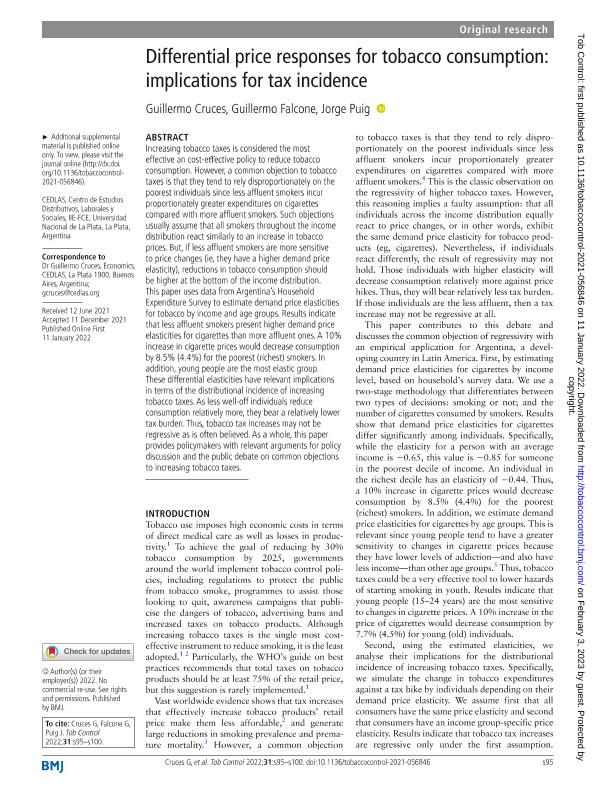Mostrar el registro sencillo del ítem
dc.contributor.author
Cruces, Guillermo Antonio

dc.contributor.author
Falcone, Guillermo Enrique

dc.contributor.author
Puig, Jorge
dc.date.available
2023-09-22T11:43:42Z
dc.date.issued
2022-01
dc.identifier.citation
Cruces, Guillermo Antonio; Falcone, Guillermo Enrique; Puig, Jorge; Differential price responses for tobacco consumption: implications for tax incidence; B M J Publishing Group; Tobacco Control; 1-2022; 1-6
dc.identifier.issn
0964-4563
dc.identifier.uri
http://hdl.handle.net/11336/212630
dc.description.abstract
Increasing tobacco taxes is considered the most effective an cost-eï¬ €ective policy to reduce tobacco consumption. However, a common objection to tobacco taxes is that they tend to rely disproportionately on the poorest individuals since less affluent smokers incur proportionately greater expenditures on cigarettes compared with more affluent smokers. Such objections usually assume that all smokers throughout the income distribution react similarly to an increase in tobacco prices. But, if less affluent smokers are more sensitive to price changes (ie, they have a higher demand price elasticity), reductions in tobacco consumption should be higher at the bottom of the income distribution. This paper uses data from Argentina's Household Expenditure Survey to estimate demand price elasticities for tobacco by income and age groups. Results indicate that less affluent smokers present higher demand price elasticities for cigarettes than more affluent ones. A 10% increase in cigarette prices would decrease consumption by 8.5% (4.4%) for the poorest (richest) smokers. In addition, young people are the most elastic group. These differential elasticities have relevant implications in terms of the distributional incidence of increasing tobacco taxes. As less well-off individuals reduce consumption relatively more, they bear a relatively lower tax burden. Thus, tobacco tax increases may not be regressive as is often believed. As a whole, this paper provides policymakers with relevant arguments for policy discussion and the public debate on common objections to increasing tobacco taxes.
dc.format
application/pdf
dc.language.iso
eng
dc.publisher
B M J Publishing Group

dc.rights
info:eu-repo/semantics/openAccess
dc.rights.uri
https://creativecommons.org/licenses/by-nc-sa/2.5/ar/
dc.subject
ECONOMICS
dc.subject
LOW/MIDDLE-INCOME COUNTRY
dc.subject
PUBLIC POLICY
dc.subject
TAXATION
dc.subject
TOBACCO INDUSTRY
dc.subject.classification
Economía, Econometría

dc.subject.classification
Economía y Negocios

dc.subject.classification
CIENCIAS SOCIALES

dc.title
Differential price responses for tobacco consumption: implications for tax incidence
dc.type
info:eu-repo/semantics/article
dc.type
info:ar-repo/semantics/artículo
dc.type
info:eu-repo/semantics/publishedVersion
dc.date.updated
2023-09-21T15:38:18Z
dc.journal.pagination
1-6
dc.journal.pais
Reino Unido

dc.journal.ciudad
Londres
dc.description.fil
Fil: Cruces, Guillermo Antonio. Universidad Nacional de la Plata. Facultad de Cs.economicas. Instituto de Investigaciones Economicas.; Argentina. Consejo Nacional de Investigaciones Científicas y Técnicas. Centro Científico Tecnológico Conicet - La Plata; Argentina
dc.description.fil
Fil: Falcone, Guillermo Enrique. Universidad Nacional de la Plata. Facultad de Cs.economicas. Instituto de Investigaciones Economicas.; Argentina. Consejo Nacional de Investigaciones Científicas y Técnicas. Centro Científico Tecnológico Conicet - La Plata; Argentina
dc.description.fil
Fil: Puig, Jorge. Universidad Nacional de la Plata. Facultad de Cs.economicas. Instituto de Investigaciones Economicas.; Argentina
dc.journal.title
Tobacco Control

dc.relation.alternativeid
info:eu-repo/semantics/altIdentifier/url/https://tobaccocontrol.bmj.com/lookup/doi/10.1136/tobaccocontrol-2021-056846
dc.relation.alternativeid
info:eu-repo/semantics/altIdentifier/doi/http://dx.doi.org/10.1136/tobaccocontrol-2021-056846
Archivos asociados
